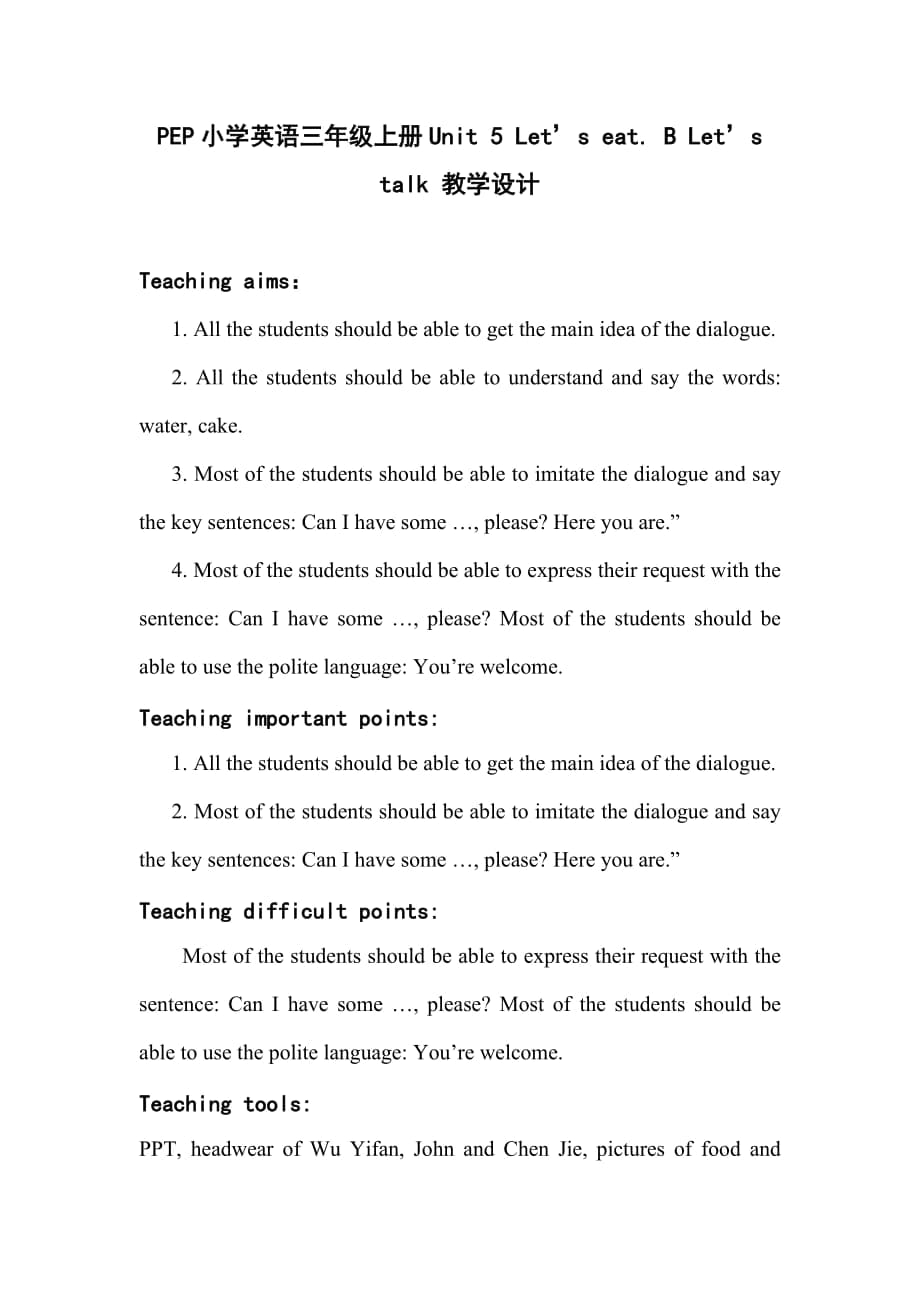《PEP小學(xué)英語三年級(jí)上冊(cè)Unit 5 Let eat B Let's talk》由會(huì)員分享��,可在線閱讀�����,更多相關(guān)《PEP小學(xué)英語三年級(jí)上冊(cè)Unit 5 Let eat B Let's talk(5頁珍藏版)》請(qǐng)?jiān)谘b配圖網(wǎng)上搜索。
1�、
PEP小學(xué)英語三年級(jí)上冊(cè)Unit 5 Let’s eat. B Let’s talk 教學(xué)設(shè)計(jì)
Teaching aims:
1. All the students should be able to get the main idea of the dialogue.
2. All the students should be able to understand and say the words: water, cake.
3. Most of the students should be able to imitate the dialogue and say the
2、 key sentences: Can I have some …, please? Here you are.”
4. Most of the students should be able to express their request with the sentence: Can I have some …, please? Most of the students should be able to use the polite language: You’re welcome.
Teaching important points:
1. All the students sh
3��、ould be able to get the main idea of the dialogue.
2. Most of the students should be able to imitate the dialogue and say the key sentences: Can I have some …, please? Here you are.”
Teaching difficult points:
Most of the students should be able to express their request with the sentence: Can I h
4�、ave some …, please? Most of the students should be able to use the polite language: You’re welcome.
Teaching tools:
PPT, headwear of Wu Yifan, John and Chen Jie, pictures of food and drinks
Teaching Steps:
Step 1: Warm up
1. 呈現(xiàn)情景,引入本課主題��。滲透Thank you . You’re welcome.
播放Let’s have a picnic音樂����,教師
5、邊畫簡筆畫邊說 “ Look! The grass is green. The trees are lush. The sun shines. What a lovely day!” PPT呈現(xiàn)Wu Yifan, John, Chen Jie 野餐的圖片��?����!?Wu Yifan, John and Chen Jie are having a picnic. What can they prepare for picnic? Can you guess?” 學(xué)生根據(jù)生活經(jīng)驗(yàn)���,用所學(xué)單詞進(jìn)行猜測�����?��;卮鹫_的學(xué)生可以獲得食物圖片���,滲透Thank you. You’re welcome.
2. 復(fù)習(xí)食
6、物等相關(guān)單詞���。
Sharp eyes 的方式呈現(xiàn)所有學(xué)生接觸過的食物及飲料�����,學(xué)生快速看圖說出單詞����。
Step 2: Presentation
1. 學(xué)生觀察情境圖�����,學(xué)習(xí)water, cake.
They can prepare so many food and drinks. But what have they prepared? 學(xué)生看情境圖快速說出認(rèn)識(shí)的食物圖片�����,然后引出新詞water, cake. 依次多種方式教讀兩個(gè)生詞�,并操練句子Have some water/ cake.
2. 學(xué)生觀看動(dòng)畫�,整體理解文本內(nèi)容�。
They have prepared so many t
7��、hings. What would Wu Yifan like now? Water or cake? Let’s watch. 學(xué)生觀看整個(gè)動(dòng)畫�,找出答案。
3. 分層學(xué)習(xí)對(duì)話內(nèi)容�����。
1) 處理Can I have some water, please?
Wu Yifan would like some water. What is his request? Let’s watch carefully. 學(xué)生觀看前半部分對(duì)話�����,尋找答案��。A. I’d like some water, please. B. Can I have some water, please? 學(xué)生找出答案之后��,
8�、ppt呈現(xiàn)句子Can I have some water, please? 教師拿出一瓶水說:“ water, have some water. ” 教讀have some water.分層教讀句子:Can I →Can I have some water→ Can I have some water, please? 之后,教師拿出實(shí)物與學(xué)生進(jìn)行對(duì)話���,學(xué)生用水的圖片與同桌進(jìn)行對(duì)話操練���。然后拓展到關(guān)于其它食物與飲料的對(duì)話。最后��,用Good to know 幫助學(xué)生深入理解Can I have some …, please? 的語用環(huán)境。
2) 突破難點(diǎn)句子You’re welcome.
W
9���、u Yifan is a polite boy. What is his polite language? Let’s watch. What about John? What is John’s polite language? 學(xué)習(xí)Thank you . You’re welcome. 通過語音遷移Very well, 語音滲透l, c, o, m 的發(fā)音以及手勢操練 welcome,運(yùn)用高低音游戲突破You’re welcome.的發(fā)音���。之后,呈現(xiàn)四幅Thank you. You’re welcome.的語用情景圖�����,學(xué)生進(jìn)行意義操練���。最后���,建議學(xué)生做有禮貌的孩子。Boys and gir
10�����、ls, be a polite child in your life.
Step 3 Practice
1. Watch, listen and imitate.
2. Read together.
3. Read in roles together.
4. Read in roles in pairs.
5. 呈現(xiàn)沒有文字的文本圖片�,學(xué)生做對(duì)話�����。
Step 4 Production
1. 對(duì)話續(xù)編活動(dòng)。
Wu Yifan would like some water. What about Chen Jie and John? Make a new dialogue betw
11����、een Chen Jie and John. PPT呈現(xiàn)陳杰說話的話語框及句子Can I have some _______, please? 學(xué)生猜測陳杰可能想吃什么。然后師生示范陳杰與John的對(duì)話����,生生練習(xí)�����,之后展示����。
2. 分享會(huì)���。
Wu Yifan, Chen Jie and John are having a picnic in the nature. Look! 課件呈現(xiàn)大自然的美景���。The nature is amazing. Go out and have a picnic more often. Enjoy the beauty of nature. Enjoy the
12、 happiness of sharing. But it’s too cold outside now. So let’s have a sharing party in the classroom. 學(xué)生拿出食物與飲料等的圖片用所學(xué)句型在小組內(nèi)進(jìn)行分享活動(dòng)���。之后���,教師拿出實(shí)物與學(xué)生進(jìn)行分享活動(dòng)���,然后兩個(gè)學(xué)生代替老師拿著老師準(zhǔn)備好的食物與飲料與同學(xué)展開分享活動(dòng)。
3. 關(guān)于“分享”的情感教育���。
Boys and girls, we learn together, play together. We can share food, share toys, share reading, share music and share the happiness. To share, to be happy.
4. 總結(jié)���。
Homework:
1. Listen and imitate the dialogue until you can read it fluently.
2. Bring food or drinks to the classroom and share them with your classmates. Use the sentences: Have some … Can I have some …, please?
 PEP小學(xué)英語三年級(jí)上冊(cè)Unit 5 Let eat B Let's talk
PEP小學(xué)英語三年級(jí)上冊(cè)Unit 5 Let eat B Let's talk

